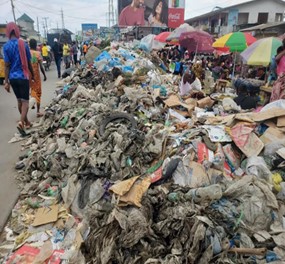Duala Market, a vital commercial center on the outskirts of Monrovia, Liberia, is grappling with a severe sanitation crisis. Mountains of uncollected garbage have overtaken the marketplace, forcing vendors onto the streets, jeopardizing their livelihoods, and posing significant health risks. This escalating problem, though long-standing, has reached a critical juncture, prompting urgent pleas for intervention from both the Monrovia City Corporation (MCC) and the national government. The market, a lifeline for countless families, is now a scene of decay and neglect, its once-vibrant atmosphere stifled by the pervasive stench of rotting refuse.
The vendors of Duala Market, who rely on the market for their daily income, are bearing the brunt of this crisis. Forced to abandon their designated stalls and compete for space on the congested roadways, they face dwindling sales and mounting frustration. Despite paying daily market fees, they are denied the basic service of waste removal. This perceived injustice is compounded by the authorities’ rigorous enforcement of street vending regulations, a stark contrast to their lax approach to waste management. The irony is palpable: vendors are penalized for occupying the streets, yet the very streets they are banished from are rendered unusable by the city’s failure to maintain basic sanitation.
The sanitation crisis has also necessitated informal, unsustainable solutions. Vendors describe paying marginalized youth, known locally as “zoogos,” to remove garbage in the absence of municipal services. While this provides temporary relief, it highlights the desperation of the vendors and underscores the inadequacy of the current waste management system. Moreover, the accumulated garbage poses a severe health hazard, increasing the risk of infections and respiratory illnesses for both vendors and customers. The market, meant to be a source of sustenance and community connection, has become a breeding ground for disease.
The overflowing garbage within the market forces vendors to spill onto the main road, creating traffic congestion that disrupts business, impedes public transportation, and endangers pedestrians. This spillover effect further underscores the interconnectedness of the sanitation issue with broader urban challenges. The market’s internal dysfunction creates external problems, impacting the flow of commerce and the safety of citizens. The solution, many believe, lies in emulating past successes in urban cleanup initiatives, particularly those implemented under former Monrovia City Mayor Mary Broh, whose aggressive and effective campaigns are remembered as a benchmark for effective governance.
The current situation is widely viewed as a failure of both policy and implementation. The gradual erosion of sanitation infrastructure, including the disappearance of public latrines and regular street sweeping, is lamented by long-time vendors. This decline is contrasted with earlier periods when such services were readily available. The absence of these essential facilities contributes to unsanitary practices, exacerbating the garbage problem. Many advocate for a multi-pronged approach that includes restoring these basic services, launching public awareness campaigns, and enforcing penalties for littering.
The call for community involvement in addressing the sanitation crisis is a recurring theme. Proposals range from employing “zoogos” in organized cleanup efforts to establishing task forces to monitor and penalize those who contribute to the problem. These suggestions reflect a desire for sustainable solutions that empower the community and hold individuals accountable for their actions. The consensus is clear: a collaborative approach involving all stakeholders, from local authorities to community members, is essential to restoring Duala Market to its former vibrancy and ensuring its continued role as a vital economic hub.














